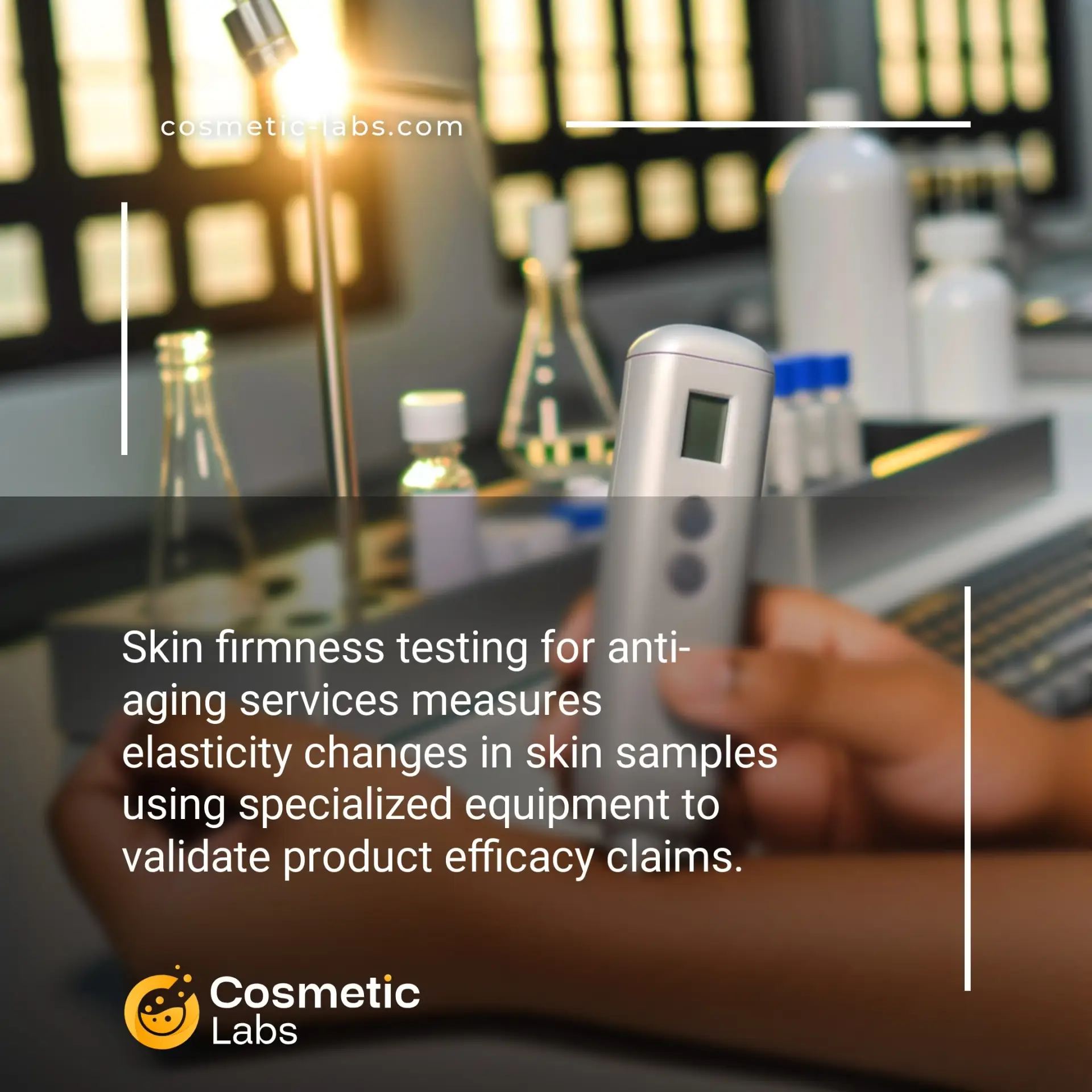Skin Firmness Testing Services for Anti-Aging Products

What is Skin firmness testing?
Skin firmness testing for anti-aging services is a biomechanical assessment that measures dermal elasticity and collagen density changes before and after product application. Labs use suction cup devices and ultrasound imaging to quantify skin bounce-back properties, providing objective data for anti-aging claims. This testing reveals how formulations affect skin structure at the dermal level, not just surface appearance.
Why do you need this service?
Cosmetic labs use skin firmness testing to validate anti-aging claims before product launch, measuring elasticity changes with cutometers and durometers across 4-12 week trials. Brands rely on these protocols to demonstrate measurable lifting effects for marketing materials, while ingredient suppliers use the data to support raw material efficacy documentation for regulatory submissions.
Who provides Skin firmness testing services?
All cosmetic labs providing Skin firmness testing services
There is no company providing these services at the moment.
Skin Firmness Testing for Anti-Aging Products
Skin firmness testing validates your anti-aging formulations through precise mechanical measurements that quantify elasticity, resilience, and structural integrity. Labs use specialized equipment like cutometers and torque meters to measure how skin responds to controlled suction and twisting forces, providing objective data for product efficacy claims.
Mechanical Testing Methods
Labs employ multiple testing protocols to assess skin firmness changes. Cutometer testing applies controlled suction to skin patches, measuring deformation and recovery patterns that indicate elasticity improvements. Torque testing evaluates resistance to twisting forces, revealing changes in skin structure and collagen density.
Testing typically includes:
- Baseline measurements before product application
- Weekly assessments during 4-8 week study periods
- Statistical analysis comparing treated vs. control areas
- Photographic documentation of visible changes
Data Analysis and Claims Support
Professional labs convert raw firmness measurements into marketable claims through statistical validation. They track percentage improvements in elasticity parameters, recovery time reductions, and viscoelastic properties that demonstrate your product’s anti-aging benefits.
Results support specific marketing claims like “improves skin firmness by 23% in 6 weeks” or “reduces skin sagging appearance.” Labs provide detailed reports with graphs, statistical significance data, and regulatory-compliant documentation for your marketing materials.
Ready to validate your anti-aging formulation’s firmness benefits? Connect with experienced testing labs on our platform to discuss your specific product requirements and timeline.
Practical Applications of Skin Firmness Testing for Anti-Aging Services
Cosmetic labs use skin firmness testing for anti-aging services to validate product claims and guide formulation decisions across multiple development stages.
Product Development and Formulation Validation
Labs conduct firmness assessments using cutometry and elastometry to evaluate peptide serums, retinol creams, and collagen-boosting formulations. These tests measure skin elasticity parameters including R2 (gross elasticity) and R7 (biological elasticity) values. Brand owners receive quantitative data showing percentage improvements in skin firmness after 28, 56, and 84-day application periods.
Testing protocols involve controlled application studies with 20-30 volunteers per product variant. Labs compare baseline measurements against post-treatment results, providing statistical significance data for marketing claims. This approach helps brands optimize active ingredient concentrations and delivery systems before market launch.
| Testing Method | Measurement Parameter | Typical Timeline | Application |
|---|---|---|---|
| Cutometry | Skin elasticity (R2, R5, R7) | 4-12 weeks | Anti-aging creams, serums |
| Elastometry | Skin firmness index | 6-8 weeks | Lifting treatments, masks |
| Torque testing | Skin torsion resistance | 8-12 weeks | Body firming products |
Regulatory Compliance and Claims Substantiation
Cosmetic manufacturers require firmness testing data to support advertising claims about lifting, tightening, and age-reversal effects. Labs generate compliant documentation for regulatory submissions in EU, US, and Asian markets. Testing reports include methodology details, statistical analysis, and photographic evidence meeting advertising standards.
Independent testing facilities provide third-party validation that strengthens legal protection against false advertising claims. Brands use these studies to support specific percentage claims like “improves skin firmness by 23% in 8 weeks.” Regulatory-compliant testing protocols follow ISO standards and include proper control groups, randomization, and blinded evaluations.
Ready to validate your anti-aging formulations? Contact specialized cosmetic labs on our platform to discuss skin firmness testing protocols tailored to your product development needs.
